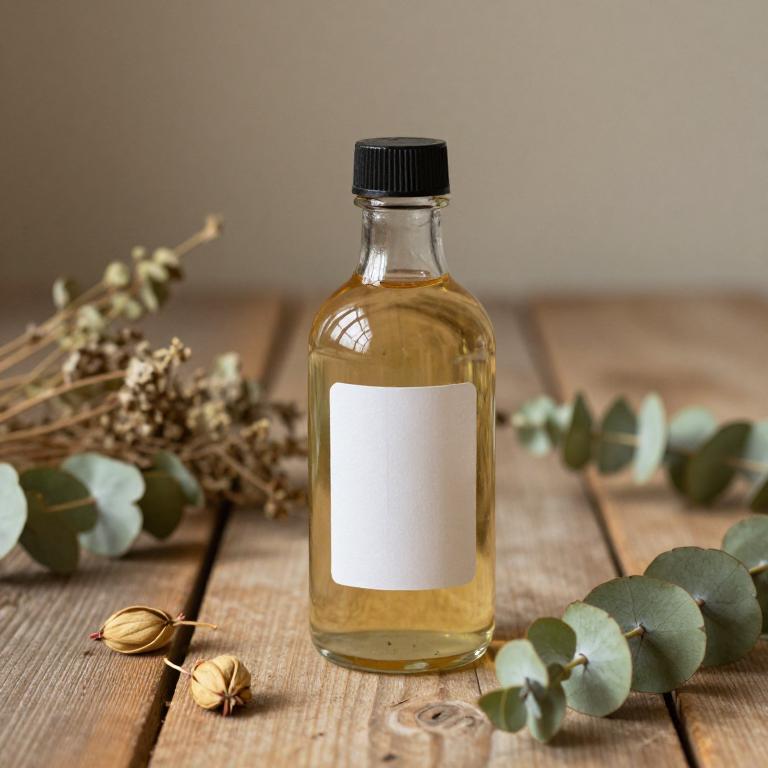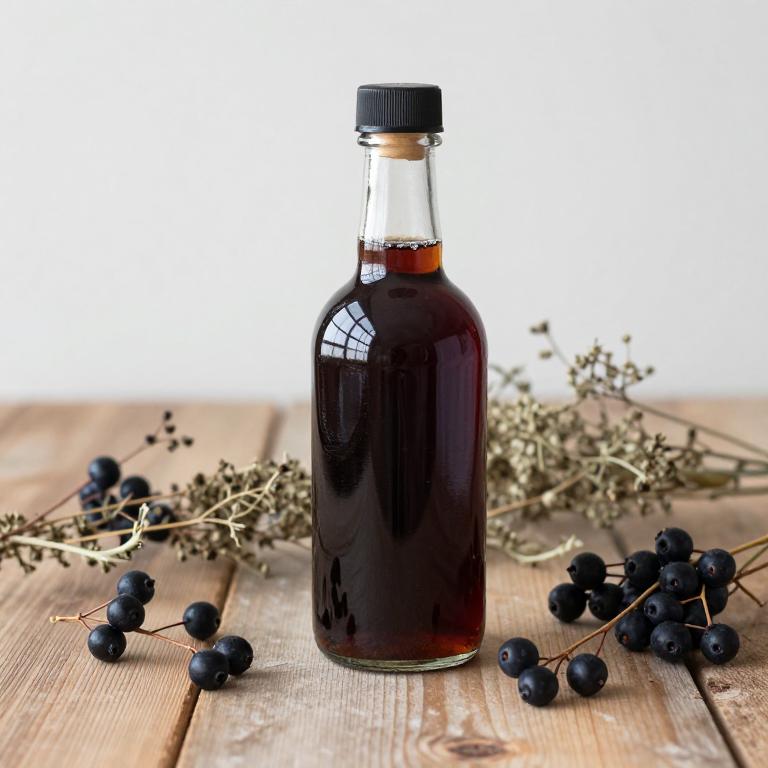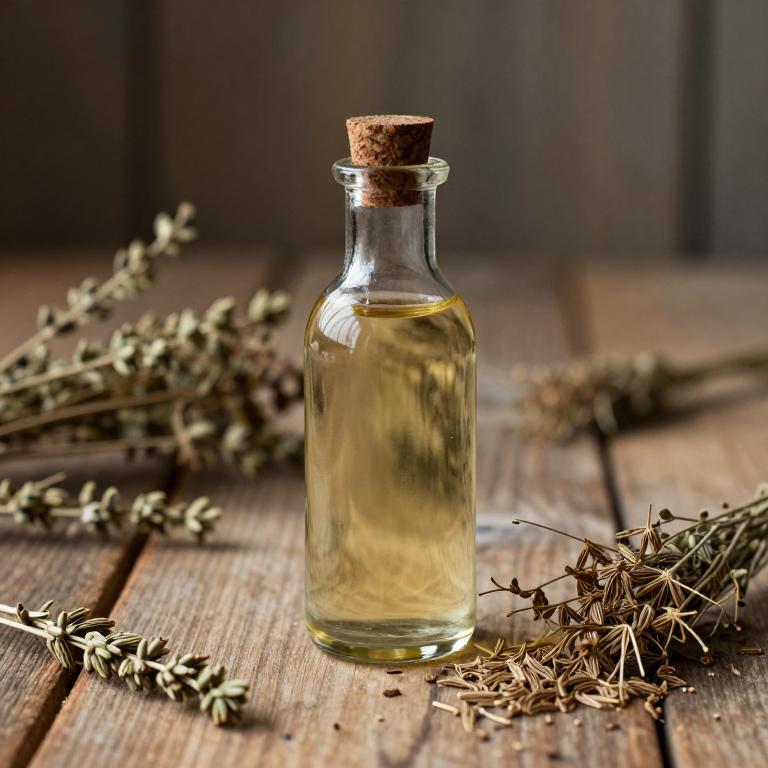10 Best Herbal Syrups For Tickling Throat

Herbal syrups are commonly used to soothe a tickling throat and alleviate symptoms of coughs and soreness.
These syrups often contain natural ingredients such as honey, ginger, licorice root, and eucalyptus, which have antimicrobial and anti-inflammatory properties. They work by coating the throat, reducing irritation, and providing a calming effect that helps ease persistent coughing. Many herbal syrups are preferred over over-the-counter medications because they are generally gentler and can be used by both adults and children.
However, it is important to consult a healthcare provider before using herbal syrups, especially for prolonged periods or in individuals with allergies or existing health conditions.
Table of Contents
- 1. Ginger (Zingiber officinale)
- 2. Fennel (Foeniculum vulgare)
- 3. Thyme (Thymus vulgaris)
- 4. Peppermint (Mentha piperita)
- 5. Licorice (Glycyrrhiza glabra)
- 6. Eucalyptus (Eucalyptus globulus)
- 7. Black elderberry (Sambucus nigra)
- 8. Rosemary (Rosmarinus officinalis)
- 9. Salvia (Salvia officinalis)
- 10. Cumin (Cuminum cyminum)
1. Ginger (Zingiber officinale)

Zingiber officinale, commonly known as ginger, is widely used in herbal syrups to soothe a tickling throat due to its anti-inflammatory and antimicrobial properties.
These syrups are often prepared by infusing fresh or dried ginger root in a base of honey or sugar, creating a warm, comforting beverage that can ease coughing and irritation. The active compounds in ginger, such as gingerol and shogaol, help reduce mucus production and calm the throat lining, providing relief from persistent coughs. Many people find ginger syrup to be a natural alternative to over-the-counter remedies, especially for those preferring herbal treatments.
However, it is important to consult a healthcare provider if symptoms persist, as persistent throat irritation may indicate a more serious underlying condition.
2. Fennel (Foeniculum vulgare)

Foeniculum vulgare, commonly known as fennel, has been traditionally used in herbal medicine for its soothing effects on the respiratory system.
Fennel herbal syrups are often prepared by steeping the dried seeds in honey or sugar syrup, creating a pleasant and aromatic remedy. These syrups are particularly effective for alleviating the discomfort of a tickling throat, as they help to reduce irritation and ease coughing. The essential oils in fennel, such as anethol, possess mild antispasmodic and anti-inflammatory properties that contribute to their therapeutic effects.
When used regularly, fennel syrup can provide natural relief for minor respiratory discomfort and support overall throat health.
3. Thyme (Thymus vulgaris)

Thymus vulgaris, commonly known as thyme, is often used in herbal syrups to soothe a tickling throat due to its antimicrobial and anti-inflammatory properties.
These syrups typically contain thyme essential oil or dried thyme leaves, which can help reduce irritation and ease coughing. The expectorant qualities of thyme aid in loosening mucus, making it easier to expel from the respiratory tract. Many people find relief from persistent throat irritation by using thyme-based syrups as a natural remedy.
However, it is important to consult a healthcare professional before use, especially for children or those with underlying health conditions.
4. Peppermint (Mentha piperita)

Mentha piperita, commonly known as peppermint, is often used in herbal syrups to alleviate the discomfort of a tickling throat.
These syrups are valued for their soothing properties, which can help reduce irritation and ease coughing. The cooling effect of peppermint oil provides a refreshing sensation that may help ease the feeling of a dry or sore throat. Many people find that taking a few drops of peppermint syrup on the tongue or mixing it with water offers quick relief.
However, it is important to consult with a healthcare professional before using these syrups, especially for children or individuals with certain medical conditions.
5. Licorice (Glycyrrhiza glabra)

Glycyrrhiza glabra, commonly known as licorice root, is widely used in herbal syrups to soothe a tickling throat due to its anti-inflammatory and expectorant properties.
The active compounds in licorice, such as glycyrrhizin and flavonoids, help reduce irritation and swelling in the throat, making it an effective remedy for coughs and soreness. Herbal syrups made from licorice are often combined with other soothing ingredients like honey or marshmallow root to enhance their effectiveness. These syrups are particularly beneficial for dry, persistent coughs and can provide relief without the side effects of over-the-counter medications.
However, long-term use of licorice-containing syrups should be monitored, as excessive intake may lead to fluid retention or blood pressure issues.
6. Eucalyptus (Eucalyptus globulus)

Eucalyptus globulus, commonly known as the Australian eucalyptus, is often used in herbal syrups to alleviate symptoms of a tickling throat.
These syrups typically contain extracts of the leaves, which are rich in essential oils like eucalyptol, known for their antimicrobial and anti-inflammatory properties. The soothing effect of eucalyptus globulus helps reduce irritation and coughing by easing the discomfort in the throat. When used as a natural remedy, these syrups can provide relief without the side effects associated with some over-the-counter medications.
However, it is advisable to consult a healthcare professional before using eucalyptus-based products, especially for children or individuals with underlying health conditions.
7. Black elderberry (Sambucus nigra)

Sambucus nigra, commonly known as the European elderberry, is often used in herbal syrups to soothe a tickling throat due to its high concentration of antioxidants and anti-inflammatory compounds.
These syrups are typically made by simmering the berries with honey or other natural sweeteners, which enhances their soothing properties. The mucilage in elderberries helps coat the throat, reducing irritation and coughing. Additionally, the immune-boosting properties of elderberry may support the body's natural defenses against respiratory infections.
While generally considered safe when used in moderation, it is important to consult a healthcare provider before using elderberry syrups, especially for children or those with allergies.
8. Rosemary (Rosmarinus officinalis)

Rosmarinus officinalis, commonly known as rosemary, is often used in herbal syrups to soothe a tickling throat due to its anti-inflammatory and antimicrobial properties.
These syrups typically combine rosemary extract with honey or other natural sweeteners to create a calming and effective remedy for soreness and irritation. The aromatic compounds in rosemary help to ease coughing and reduce mucus buildup, providing relief from persistent throat discomfort. Many people find that the soothing scent of rosemary in these syrups also has a calming effect, helping to ease stress-related throat issues.
While generally safe, it is advisable to consult a healthcare professional before using rosemary syrups, especially for children or individuals with allergies.
9. Salvia (Salvia officinalis)

Salvia officinalis, commonly known as sage, is often used in herbal syrups to soothe a tickling throat due to its antimicrobial and anti-inflammatory properties.
These syrups typically combine dried sage leaves with honey or other natural sweeteners to create a soothing and palatable remedy. The essential oils in sage, such as thujone and camphor, help reduce irritation and ease coughing by coating the throat. Many people find relief from persistent coughs or sore throats by using sage-based syrups regularly.
However, it is important to consult a healthcare professional before using sage syrup, especially for prolonged periods or in individuals with certain medical conditions.
10. Cumin (Cuminum cyminum)

Cuminum cyminum, commonly known as cumin, is often used in herbal syrups to soothe a tickling throat due to its expectorant and anti-inflammatory properties.
These syrups are typically prepared by combining cumin seeds with honey, ginger, and other soothing herbs to enhance their therapeutic effects. The warming nature of cumin helps to loosen mucus and reduce irritation in the throat, making it a popular remedy for coughs and sore throats. Herbal syrups containing cumin are often recommended for their natural and gentle approach to symptom relief.
However, it is important to consult a healthcare provider before use, especially for children or individuals with chronic conditions.